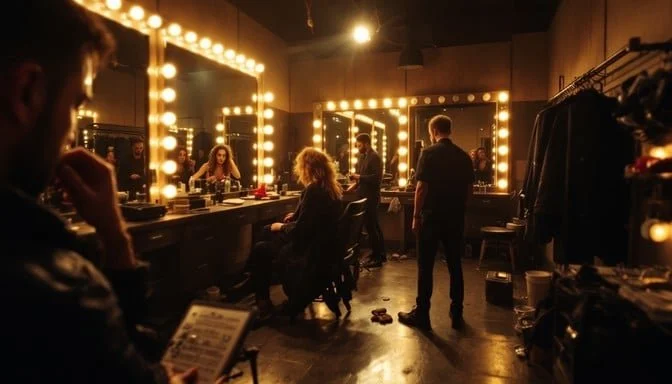Being Confident on Stage, Not Arrogant Off It
by Chris Peterson
There’s something I keep noticing in this industry. We tell artists to take up space, really take it, boldly and unapologetically, and then we panic a little when they actually do. Or worse, we panic when we do. It’s that tiny voice in the back of your head whispering, “Was that confidence, or did I just step into arrogance without noticing?” And I think every theatre artist, whether they’re in the booth or at the drafting table or in front of a mirror warming up, has wrestled with that question at some point.
What I’ve learned is that the line between the two isn’t as dramatic as people think. It’s usually just the difference between believing in yourself and convincing yourself you’re the only one worth believing in. Confidence says, “I’ve got something to offer.” Arrogance says, “I’m the only one here who does.” And when you say it like that, the line becomes pretty clear.
The funny thing is that confident people are almost never the ones talking about how confident they are. They’re too busy being curious. They ask how a prop was built, or what software the sound designer uses, or why the director made a certain choice. They lean in because they want to know more, not because they want to prove anything.
Curiosity keeps your ego in check while still letting you feel proud of the things you know. It’s the antidote to arrogance and honestly, it’s a much more interesting way to move through a room.
The other truth, and I say this gently, is that people never see the full version of you. They don’t see the late night rehearsals where you doubted everything. They don’t see your Google searches or the moment you almost backed out of an audition or the hours you spent rewriting a cue sheet. They see the outcome. The finished edges. And sometimes that reads to them as confident, and sometimes it reads as “oh wow, dial it down.” You can’t manage every interpretation, and you shouldn’t try to, but you can make sure your behavior matches the intention behind it. A little generosity goes a long way, even when you’re quiet.
When I think about the people in theatre who balance this the best, they all seem to have the same quiet habits. They listen, really listen, without waiting for their turn to talk. They say thank you in a way that lands. They take notes without flinching. They celebrate other people’s big wins even when they’re having a small day. They know how to share a moment onstage or in a meeting without overclaiming it. None of that diminishes their confidence. If anything, it’s the thing that makes their confidence feel grounded instead of performative.
And maybe the biggest piece is this. The most confident artists I know have something anchoring them outside of the work. They don’t need the role or the job or the title to define who they are. Arrogance shows up the minute you start believing the work is the only thing holding you together. That’s when ego steps in as a substitute for identity. But when you know who you are after the curtain falls, when you can go home and still feel like yourself, confidence doesn’t have to push. It just exists.
So if you’re trying to figure out how to walk into a room with your shoulders back without becoming the person people avoid at intermission, here’s the simplest version. Stay curious, stay kind, keep your edges soft, and remember that theatre is built on connection, not competition. Confidence is warm. Arrogance is brittle. If you know which one you’re choosing, the people around you will feel it too.
